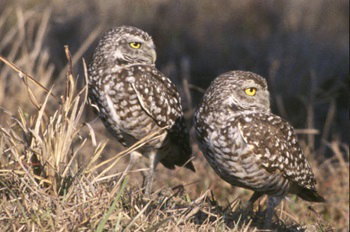
|
Michigan welcomed some rare owls to the Upper Peninsula this fall, a trend that is likely to continue as northern owls migrate south into Michigan for the winter. At the end of September, a burrowing owl (like those pictured here) was seen at Whitefish Point, on the northern tip of Chippewa County, for the first time since 1986! This sighting is one of only four known records in Michigan.
Vagrants that are seen in unusual places often return to their home range, and many folks suspect this particular bird was from Florida and visited Michigan as a result of Hurricane Helene. Just a few weeks later, a northern hawk owl also was spotted at Whitefish Point. Northern owls such as the northern hawk owl can show up in the Great Lakes region each winter, leaving their colder habitats like the boreal forests of Canada and the Arctic tundra behind – but this visitor arrived a season early!
Both owls drew crowds of interested birders and photographers, and each season hundreds of species draw us outdoors as they flit in the treetops, hop through shrubs or run along shorelines. Whether in the backyard or deep forest, birding best practices can help protect our Great Lakes birds and visitors. Here are a few to start:
Get more top tips and explore helpful resources to guide your next birding trip.
Questions? Contact Erin Rowan Ford at 313-820-0809.